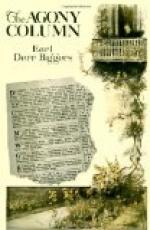We climbed—the constable and I—a narrow stone stairway somewhere at the back of New Scotland Yard, and so came to the inspector’s room. Bray was waiting for us, smiling and confident. I remember —silly as the detail is—that he wore in his buttonhole a white rose. His manner of greeting me was more genial than usual. He began by informing me that the police had apprehended the man who, they believed, was guilty of the captain’s murder.
“There is one detail to be cleared up,” he said. “You told me the other night that it was shortly after seven o’clock when you heard the sounds of struggle in the room above you. You were somewhat excited at the time, and under similar circumstances men have been known to make mistakes. Have you considered the matter since? Is it not possible that you were in error in regard to the hour?”
I recalled Hughes’ advice to humor the inspector; and I said that, having thought it over, I was not quite sure. It might have been earlier than seven—say six-thirty.
“Exactly,” said Bray. He seemed rather pleased. “The natural stress of the moment—I understand. Wilkinson bring in your prisoner. The constable addressed turned and left the room, coming back a moment later with Lieutenant Norman Fraser-Freer. The boy was pale; I could see at a glance that he had not slept for several nights.
“Lieutenant,” said Bray very sharply, “will you tell me—is it true that your brother, the late captain, had loaned you a large sum of money a year or so ago?”
“Quite true,” answered the lieutenant in a low voice.
“You and he had quarreled about the amount of money you spent?”
“Yes.”
“By his death you became the sole heir of your father, the general. Your position with the money-lenders was quite altered. Am I right?”
“I fancy so.”
“Last Thursday afternoon you went to the Army and Navy Stores and purchased a revolver. You already had your service weapon, but to shoot a man with a bullet from that would be to make the hunt of the police for the murderer absurdly simple.”
The boy made no answer.
“Let us suppose,” Bray went on, “that last Thursday evening at half after six you called on your brother in his rooms at Adelphi Terrace. There was an argument about money. You became enraged. You saw him and him alone between you and the fortune you needed so badly. Then —I am only supposing—you noticed on his table an odd knife he had brought from India—safer—more silent—than a gun. You seized it—”
“Why suppose?” the boy broke in. “I’m not trying to conceal anything. You’re right—I did it! I killed my brother! Now let us get the whole business over as soon as may be.”
Into the face of Inspector Bray there came at that moment a look that has puzzling me ever since—a look that has recurred to my mind again and again,—in the stress and storm of this eventful day. It was only too evident that this confession came to him as a shock. I presume so easy a victory seemed hollow to him; he was wishing the boy had put up a fight. Policemen are probably like that.




